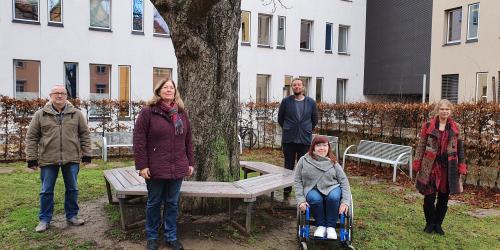
Largest reform in guardianship law focuses on more autonomy
Since 01.01.2023 the new guardianship and care law applies: It aims more strongly at autonomy and self-determination and is the largest reform in the care law since its introduction and the abolition of the Entmündigung of full-aged humans.
Major care reform since January 1, 2023.
In the past 30 years, there have been several legislative changes in guardianship law - in 2005 with the VBVG (Guardianship and Caregiver Remuneration Act), in 2009 with the Living Wills Act, in 2014 with the Strengthening of Guardianship Authorities Act, and currently with the major guardianship reform: it thus strengthens the self-determination of adults who, due to illness or disability , cannotmanage their affairs and everyday life without help. For example, it must be clearly regulated whether external care is actually necessary or whether a private person of trust should be issued with power of attorney instead. In addition, the person concerned has the right of co-determination in the selection of a caregiver and in the choice of living space - a caregiver cannot, for example, arbitrarily terminate the apartment of the person to be cared for.
At the same time, the reform also represents a quality assurance of professional care, in that the care authority will take on new tasks under the Care Organization Act: For the first time, there will be a uniform nationwide registration of professional caregivers, which the care authority will take over as the lead agency. "Respect and equality also towards old, frail people with and without disabilities is the goal of the major reform - and we are working on this together," explains social psychologist Astrid Lindner, head of the care authority of the city of Jena and involved from the beginning .
Retrospect and current events
In 2022, the guardianship authority of the city of Jena celebrated its 30th anniversary. Since the guardianship law came into force in 1992 - and thus the birth of the nationwide municipal guardianship authorities - many things changed from the ground up: Guardians no longer existed; instead, greater emphasis was placed on preserving the right of self-determination for those under care.
Astrid Lindner and her team of four social workers advise people with disabilities in difficult life and decision-making situations - with the goal: "We take away the fear and get the care on the way. The focus is on the will of the person concerned and support in independent rather than representative decision-making - always under the premise: no self-endangerment, no indebtedness and no health risks."

Approximately 1,700 cases of care in Jena: including an increasing number of under-30s
The number of care cases in Jena has been stable for the past 10 years - it is currently around 1,700; the first 20 years saw a dynamic increase. This was also due to the fact that too many guardianships were ordered too quickly by courts, explains Lindner. In the meantime, there are also various low-threshold offers for those affected - so-called care-avoiding assistance - to help them cope with everyday life. In contrast, the cases have become more complex and multi-layered overall over the past ten years.
Their clientele are in particular mentally ill and mentally, emotionally and/or physically handicapped persons who cannot or can only partially handle their affairs on their own from the age of 18 - and not, as is often assumed, only senior citizens. "In fact, we can even see an increase in people up to 30 years of age. More and more younger people are making use of our care services; a similar trend is then only seen again among those over 60," says Lindner.
Anyone can find themselves in a situation in life where they need the support and advice of someone else. An accident, the onset of a serious illness or a decline in mental strength could be one such cause. Nevertheless, daily life goes on with all the decisions and consequences. Then it's good to have made provisions. "When the usual life changes from one day to the next and the preparation time is gone, often one is not even aware of the possibilities and necessities. That's the moment when we as an authority can provide support," explains Lindner, who is retiring in June 2023.
This also includes comprehensive advice on the topics of health care proxy, guardianship procedures and living wills. Both appointed guardians and privately commissioned proxies receive advice and support from the guardianship authority. There are currently 45 professional guardians and 40 volunteers.
Assessment for guardianship evaluation takes place in three steps
Contact with the guardianship authority comes about in various ways: one possibility may be a tip-off from an outpatient care service or an inpatient residential facility that the person concerned is no longer able to manage his or her affairs on his or her own. Private individuals can also contact the specialist unit if they need advice and information on issues relating to legal guardianship and how to avoid it.
The guardianship court receives an application form, after which three steps follow in the guardianship procedure:On behalf of the court, the guardianship authority prepares a social report in which comments are made on the person's medical history, curriculum vitae and course of illness. The aim here is to clarify whether or not care should be established for a person. In the next step, the court commissions an expert to prepare an expert opinion that is to determine the medical prerequisites for appointing a guardian for the person concerned.
Whereas an expert opinion was sufficient under the old legislation, there is now a fundamental obligation to prepare a qualified social report. Finally, a judicial hearing takes place either on site or in court. A guardianship can only be established if the person concerned can freely consent to it.
